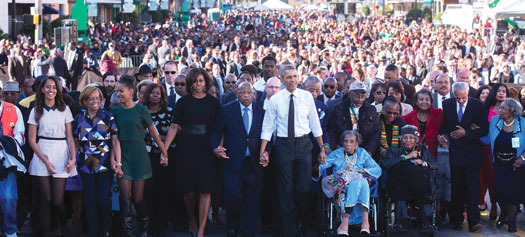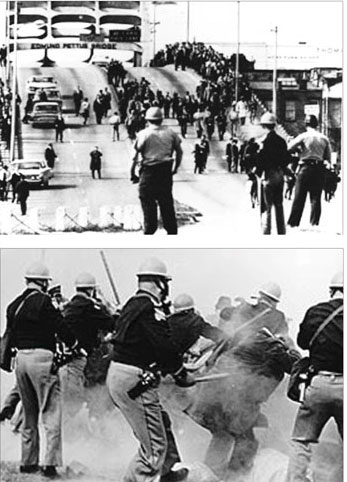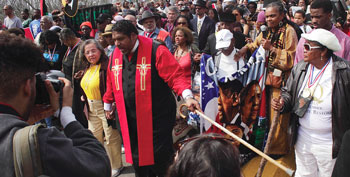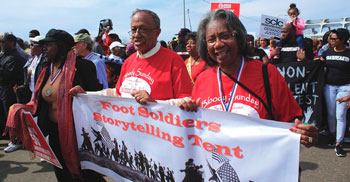Five decades after Selma and 'Bloody Sunday'
By Starla Muhammad and J.A. Salaam Final Call staffers | Last updated: Mar 12, 2015 - 11:49:03 AMWhat's your opinion on this article?

The Obama family join hands as they begin the march with the foot soldiers across the Edmund Pettus Bridge. Photo: Official White House photo/Lawrence Jackson
|
SELMA, Ala. (FinalCall.com) - Tens of thousands converged here commemorating the 50-year anniversary of “Bloody Sunday.” a pivotal turning point in the civil rights struggle in a country that despite presenting itself as a beacon of democracy, opportunity and equality to the world, continues being forced to face the reality that its Black citizens are still disenfranchised in key socio-economic, educational and political areas.
Now that the streets of Selma are cleared and President Barack Obama, over 100 members of U.S. Congress, local and state politicians, community leaders, activists and crowds have gone, what does it all mean and what looms on the horizon for racial progress, fair treatment and protection under the law for Black America?

State troopers swing billy clubs to break up a civil rights voting march in Selma, Ala., March 7, 1965. Photos: MGN Online
|
For many who came commemorating, honoring and reflecting on the 1965 march from Selma to Montgomery by participating in a weekend of panel discussions, concerts, town hall meetings and speeches March 6-8, there is more work to do.
Many point to Barack Obama as the country’s first Black president and his address from the Edmund Pettus Bridge, where five decades earlier, peaceful protesters were viciously attacked by Alabama State Troopers as a sign of monumental progress. Eric Holder, the U.S. Attorney General, also Black, and his appointed successor, Loretta Lynch, is a Black woman.
Record numbers of Black elected officials, millionaires, movie stars and entertainers is proof America has come a long way, the country is better off and the scourge of racism and discrimination has been eradicated or at the very least is no longer sanctioned by law, say the optimists.
President Obama in his March 7 remarks rejected the notion that nothing had changed when it came to race relations even in the face of the scathing report released by the Department of Justice on the Ferguson Police Department. The report uncovered a pattern of systematic racial bias by police toward the St. Louis suburb’s Black residents.
“What happened in Ferguson may not be unique, but it’s no longer endemic, it’s no longer sanctioned by law and custom; and before the civil rights movement, it most surely was,” said the president. But he also conceded it is a more common mistake to suggest what transpired in Ferguson, sparked by the shooting death of Michael Brown, Jr., was an isolated incident and that racism and intolerance no longer exists.

Rev. William Barber, president of the North Carolina NAACP State Conference, leads marchers during 50th anniversary of Bloody Sunday march Selma, Ala. Photo: D.L. Phillips
|
Nationwide, anger and frustration have gripped young people and others who have organized and protested police shootings and abuses of young, Black men and women.
There are reports the Ku Klux Klan distributed fliers in Selma in the weeks leading up to the 50th anniversary events.
According to a CNN poll, race relations are worse under President Obama. According to the poll, “39 percent of Americans say relations between Blacks and Whites have worsened since he took office, including 45 percent of Whites and 26 percent of Blacks. Just 15 percent of Americans say race relations have improved under Obama, while 45 percent say they have stayed about the same.” Those results were split along party lines with Republicans being less favorable toward Mr. Obama than Democrats.
Equal justice under the law and racial equality did not exist in 1965 for Black America and it is still a fight to achieve justice in 2015, said many who attended this year’s commemoration.
“Fifty years later are we as a people better off? And the answer is no. There’s far too many of our people who are still suffering. Yes there’s a few of us that have done very well, but what individuals do is very pale and weak in comparison to what we can do collectively,” said Oshi Adelabu who traveled to Selma from Milwaukee to be part of the 50-year commemoration.
The condition of Black people has gotten better incrementally but not monumentally, said Mr. Adelabu. “Is the education for our people better, are we decreasing the number of us incarcerated, is our health situation better? The bottom line is no we are not better 50-years later; our condition as a people is worse,” he said.
Many point to the gutting of the 1965 Voting Rights Act which was enacted days after Bloody Sunday to ensure the voting rights of Blacks would be honored. But key provisions of that act have been struck down, which is further proof, activists argue, that the fight is not over.
Still under attack
To march in Selma and to lay wreathes on the Edmund Pettus Bridge without working to restore the marchers’ greatest legacy is hypocritical and self-serving, said Brenda Wright, vice president of Legal Strategies at Demos, a New York-based public policy group. Several bills to restore the Voting Rights Act will be introduced in the 114th Congress, and we’re expecting every member of Congress to work diligently and thoughtfully to pass legislation that fully protects voters from discrimination, said Ms. Wright.

Thousands came to Selma, Ala. on March 6-8 to commemorate the 50th anniversary of a demonstration that opened the door to the 1965 Voting Rights Act. Photo: Tina Cramer
|
Supreme Court has gutted Section 5 of the Voting Rights Act, which was the enforcement provision, and requirements for photo IDs to vote are sweeping the country, along with proof of citizenship to register to vote, alongside fewer registration days, shorter registration hours and fewer voting days, said Sen. Sanders.
“We must stop this march back to the past,” said Sen. Sanders, who noted Black men were given the legal right to vote in the 1870s but lost their voting rights. This must be a time to recommit to the full universal right to vote “in our hearts and in our spirits and in our lives,” he said. “It’s not enough to have a milquetoast Voting Rights Act Section 5, it’s not enough to have a very weak Section 5. We have to have the full effectiveness of Section 5 of the 1965 Voting Rights Act,” he said.
There are those who say we can’t get it, but in 1965 there was no chance for voting rights legislation and opponents had everything and the other side had nothing but a willingness to put their bodies on the line marching and singing for justice and got the most effective piece of civil rights legislation ever enacted, he said.
John Lewis, who marched across the bridge and was beaten as a teenager, came back as a U.S. congressman from Georgia and a stalwart of the civil rights movement.
“We come to Selma to be renewed. We come to be inspired, we come to be reminded that we must do the work that justice and equality calls us to do,” he said.
Six hundred people, walking two by two marched into history, said Rep. Lewis. They didn’t interfere with traffic or commerce but were peaceful, quiet and showing a kind of a military-style discipline, he said.
“We were beaten, tear gassed. Some of us were left bloody right here on this bridge. Seventeen of us were hospitalized that day but we never became bitter or hostile. We kept believing that the truth we stood for would have the final say,” said Rep. Lewis.
The march changed the country forever and America will never be the same because of what happened on this bridge, he said. Eight days after Bloody Sunday, President Johnson gave the most important speech ever on the question of voting rights, saying the time of justice had come and no force could hold it back, said Rep. Lewis. President Johnson said at times history and fate meet at a single point and one instance was in Selma, Ala., said Rep. Lewis. “The Selma movement is saying today we all can do something,” he said. In the final analysis we are one family living in the “American house,” and are one people regardless of race, said Rep. Lewis before introducing President Obama.
Rev. Evelyn Manns was on the ground in 1965 as part of the Student Nonviolent Coordinating Committee (SNCC) founded by Dr. King. She told The Final Call the situation today looks just as bad as 50-years ago. Rev. Manns and four of her classmates joined SNCC in 1962.
“We led marches downtown Selma. It was horrific the thing we went through. I was on the Edmund Pettus Bridge on Bloody Sunday, March 7, 1965. I was there. And I’m disturbed and I’m hurt because of the situation in Selma because 50 years we’re in the post-Martin era. Fifty years after Martin, it still looks pretty bad,” said Rev. Manns.
“They’re ways down the road but they are not yet in the Promised Land. I am praying that we will all learn something here that would be enlightening again, that our consciousness would be raised again and we will go back to the cities that we have come from and bring back the sense that we as a people have not arrived yet. And we must come back to the streets and we must boycott and we must make demands not just for ourselves but for all people. That’s my hope and that’s my prayer.”
The significance of that day 50 years ago and the struggle that continues was not lost on 13-year-old Cialeah Page.
“I think some things have changed such as the voting rights, but we are not free totally as a country. There’s been a few changes like the voting rights and integrated schools, but we still have racism like (what happened to) Trayvon Martin and things like that and Mike Brown.” The non-indictment of Officer Darren Wilson and the not guilty verdict of George Zimmerman offended her, she said.
But for Loki, a 16-year-old from Ferguson, there was a pain of rejection he felt from a lack of acknowledgement from President Obama about Ferguson. Loki, from the Lost Voices, was in tears after the event.
“When I was getting tear gassed, Obama didn’t say nothing. He didn’t say nothing about them letting the dogs out on us, getting shot at with rubber bullets, he didn’t say nothing,” he said. “This was very disrespectful to come here. I’m thinking it’s about the revolution and these people acting like it’s a damn party. I don’t mean no disrespect. I’m just hurt man because we didn’t do anything wrong, but the way the elders talked to us because we were expressing ourselves. This whole thing was an insult to what we stand for, we didn’t come here for this. … it’s wrong man,” said Loki.
The fight continues
According to a recent report by the Joint Center For Political and Economic Studies titled, “50 Years Of The Voting Rights Act: The State of Race in Politics,” Blacks were the least advantaged group in America from 1972 to 2010 in terms of policy outcomes. And though the number of Black elected officials has increased to over 10,000, they still make up a smaller share of the U.S. House of Representatives, U.S. Senate, state legislatures and city councils than the percentage of Blacks in America’s population.
Activists in the civil rights movement used the strategy of civil disobedience and violated unjust laws to replace them with better laws, said the Honorable Minister Louis Farrakhan of the Nation of Islam. But the masses of Black people have not been placed in a position by our leaders to take advantage of these better laws, explained Min. Farrakhan. The Muslim leader also said as long as there is injustice in any shape, form or fashion that hinders growth and development of any people that are a part of the fabric of America, civil and activist-rights organizations and leaders are needed to continue to work and fight for change.
A Republican-dominated Congress on the federal level and in many state legislatures around the country will make enacting any changes to voter ID laws and systematic law enforcement changes an uphill battle. But it is worth the fight, say activists.
Charles Steele, president and CEO of the Southern Christian Leadership Conference (SCLC), said, “The people are ready. They are ready for movement. You know we lost the 1965 Voting Rights Act that we’re commemorating this weekend and all of next week. We must go back to the streets in peace and nonviolence. We must stay in this system’s face because we are not free. We must continue.” SCLC was founded by Dr. King. Dr. Steele made those comments March 7 to Dorothy Tillman on her Chicago radio show on WVON-AM 1690 broadcasting live from Montgomery, Ala.
Dr. Steele and others were planning to walk from Selma to Montgomery for 10 miles each day, recreating the 1965 March.
Lesley McSpadden, mother of Mike Brown, Jr. agreed that the struggle continues.
“Being here in Selma was important to me because they did march across the bridge for voting right and this year my son would be able to vote but he was killed. It’s not fair and it’s unjust to a lot of us, not just Blacks,” she told The Final Call.
“I don’t know where we go from here but I hope we are going in a positive direction and I hope that some change, more change, can come from it. Not just from the death of my son, but the burden from us as Blacks have been carrying for at least 50 or more years.”
Jim Webb who was also a foot soldier in the movement said Dr. King asked him to come to Selma for two weeks of training in 1965. To say things have not changed is to have your eyes completely closed, he told The Final Call.
“But to think they have changed enough is to be stupid. Racism has taken on a completely different face, it’s not the blatant in your face kind of activities that we had in the 60s; it’s very subtle,” said Mr. Webb. The work should continue on multiple fronts, similar to a three-legged stool, he said.
“Two of the legs we got pretty well have in place, one leg was civil rights, the second leg was voting rights and the third leg was economic rights. We never got the economic rights and to think that the government will protect our rights. Our rights will never be protected by anybody other than ourselves.”
INSIDE STORIES AND REVIEWS
-
-
About Harriett ... and the Negro Hollywood Road Show
By Rabiah Muhammad, Guest Columnist » Full Story -
Skepticism greets Jay-Z, NFL talk of inspiring change
By Bryan 18X Crawford and Richard B. Muhammad The Final Call Newspaper @TheFinalCall » Full Story -
The painful problem of Black girls and suicide
By Charlene Muhammad -National Correspondent- » Full Story -
Exploitation of Innocence - Report: Perceptions, policies hurting Black girls
By Charlene Muhammad -National Correspondent- » Full Story -
Big Ballin: Big ideas fuel a father’s Big Baller Brand and brash business sense
By Bryan Crawford -Contributing Writer- » Full Story






 Click Here Stay Connected!
Click Here Stay Connected!








